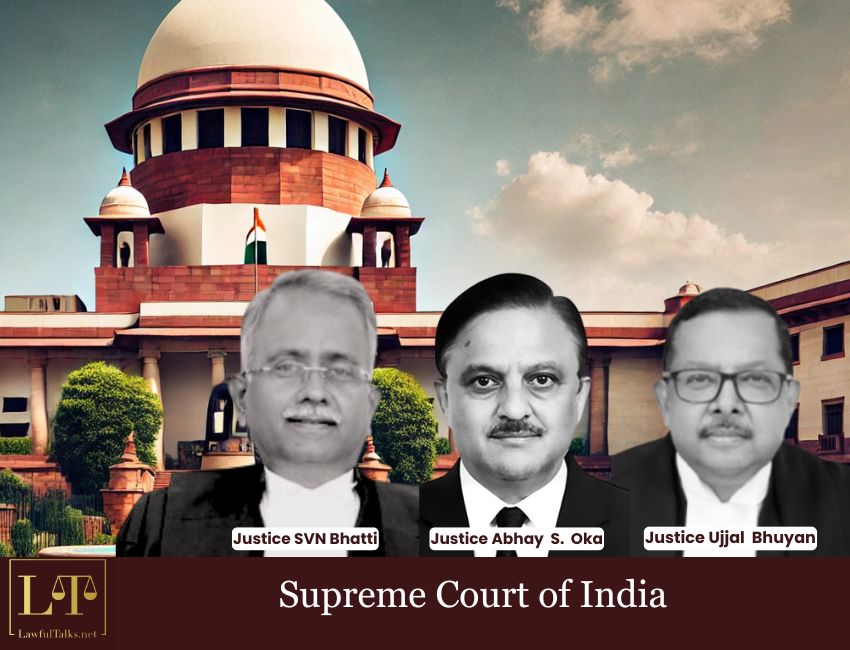Allahabad HC Sets Aside Afzal Ansari's Conviction, Allows Him to Continue as MP

In a pivotal judgment, the Supreme Court of India has comprehensively restructured the process of designating Senior Advocates. The three-judge Bench comprising Justice Abhay S. Oka, Justice Ujjal Bhuyan, and Justice SVN Bhatti has directed all High Courts to undertake systemic reforms, putting an end to the contentious points-based marking system and re-empowering the Full Court as the final authority in designations.

Marking a clear departure from the earlier framework set in the 2017 Indira Jaising judgment, the Court has set a strict timeline for implementation, stating: “It will be appropriate if all the High Courts frame Rules in terms of what is held in this decision within a period of 4 months from today by amending or substituting the existing Rules.”
The judgment emphasizes that the authority to designate advocates must rest solely with the Full Court of the respective High Court or the Supreme Court. It lays down unequivocally that, “The decision to confer designation shall be of the Full Court of the High Courts or this Court;”
Applications from eligible advocates will continue to be screened by a Permanent Secretariat, but the Secretariat’s role is strictly administrative. The ultimate decision-making responsibility lies with the Full Court, which has the discretion to confer designations based either on consensus or, where necessary, through a vote. The Court held:
“The applications of all candidates found to be eligible by the Permanent Secretariat along with relevant documents submitted by the applicants shall be placed before the Full House. An endeavour can always be made to arrive at consensus. However, if a consensus on designation of Advocates is not arrived at, the decision-making must be by a democratic method of voting.”
While addressing concerns surrounding transparency and free expression in voting, the Court refrained from mandating a universal mechanism for all High Courts, instead holding that:
“Whether in a given case there should be a secret ballot, is a decision which can be best left to the High Courts to take a call considering facts and circumstances of the given case;”
On the eligibility criteria, the Court declined to interfere with the current experience requirement and maintained that:
“Minimum qualification of 10 years of practice fixed by Indira Jaising-1 needs no reconsideration;”
Both application-based and suo motu designations have been permitted under the new regime. Advocates may continue applying for designation, which will be taken as their consent under Section 16(2) of the Advocates Act. At the same time, courts may also initiate the designation process without any formal application, where appropriate. As the Court clarified:
“The practice of Advocates making applications for grant of designation can continue as the act of making application can be treated as consent of the Advocates concerned for designation. Additionally, the Full Court may consider and confer designation dehors an application in a deserving case;”
Crucially, the Court has also barred judges from individually recommending candidates for designation, addressing a key concern about possible favouritism and lobbying. The judgment categorically states:
“In the scheme of Section 16(2), there is no scope for individual Judges of this Court or High Courts to recommend candidate for designation;”
To ensure consistency and timely recognition of deserving advocates, the Court mandated that:
“At least one exercise of designation should be undertaken every calendar year.”
However, in a transitional safeguard, it has barred fresh designation processes until each High Court adopts revised rules conforming with the new guidelines. It explained:
“The processes already initiated on the basis of decisions of this Court in the case of Indira Jaising-1 and Indira Jaising-2 shall continue to be governed by the said decisions. However, new process shall not be initiated and new applications shall not be considered unless there is a proper regime of Rules framed by the High Courts;”
Finally, acknowledging the evolving needs of the legal profession, the Supreme Court has called for regular institutional introspection:
“Every endeavour shall be made to improve the regime/system of designation by periodically reviewing the same by this Court and the respective High Courts.”
Case Title: Jitender @ Kalla v. State (Govt. of NCT of Delhi) & Anr.






























































































































































































































































































































































































































































































































































































































































































































































